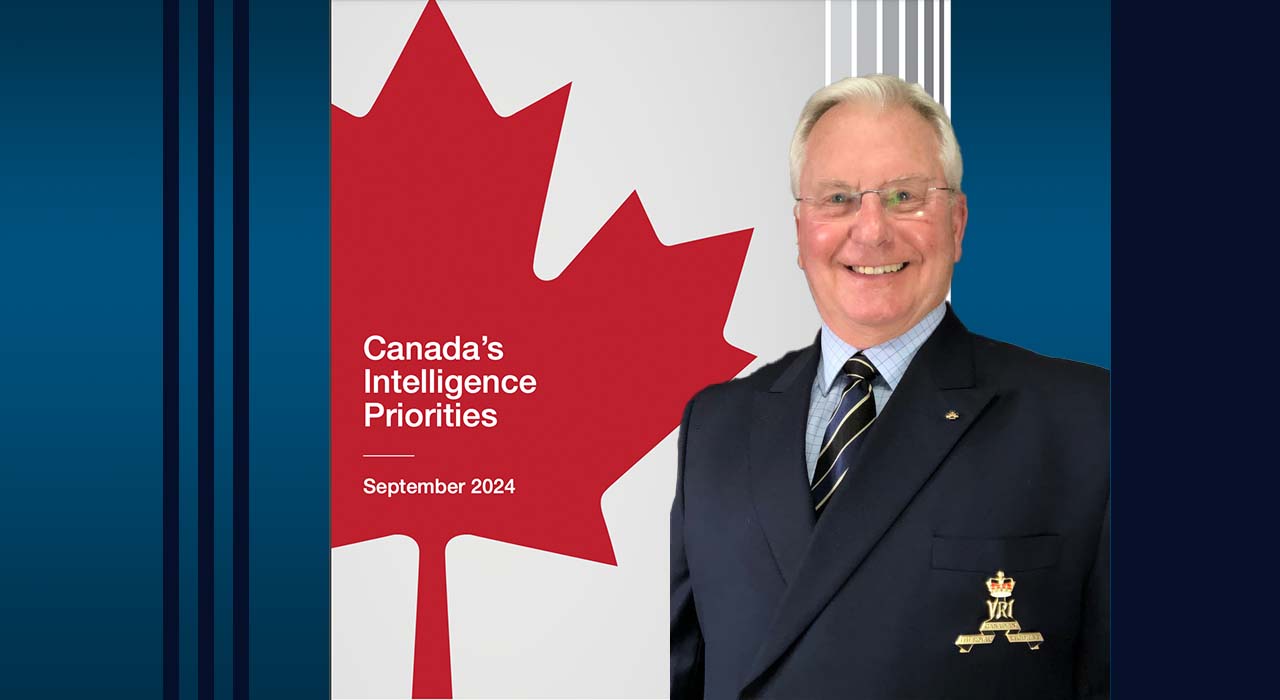3 October, 2024
By James Cox
On 18 September 2024, the government’s Privy Council Office (PCO) publicly released Canada’s Intelligence Priorities. This is the first time intelligence priorities have been publicly aired, but regrettably, the effort neither inspires confidence nor is it all that helpful. While government might be commended for this initial attempt to engage in public discussion of intelligence issues, the publication itself typifies the elementary level of intelligence dialogue in Canada, and the general lack of substantive understanding of the intelligence function across government departments and agencies generally, and particularly in the PCO.
In the broad, overall field of academic research devoted to the study of intelligence, there are two sub-fields, or genre, of intelligence studies. First there is the historically established study of intelligence as a biological function, particularly in humans, as it has evolved through natural selection over thousands of years. The field has provided rich discourse derived from centuries of thought, research, experimentation, and debate, in fields such as biology, neuroscience, philosophy, psychology, and sociology. Here, intelligence is generally conceived of as the cognitive capacity of an entity to solve problems, advantageously adapting to circumstances within the contested environment in which they live. Intelligence does not exist for its own sake. It has a point to it.
On the other hand, a more recent genre features a much narrower and decidedly less robust dialogue about intelligence. Intelligence, as it is conceived in national security, law-enforcement, and military contexts, has not blossomed or matured all that much over that past century. If anything, this conception of intelligence has become almost pathologically narrow and parochially focussed on the idea of a product, to the point that intelligence is often erroneously described as a synonym of information, culminating simply in delivery of a report to a decision-maker. While substantive academic study and writing is growing in the United States, Europe, and Australia, there is a dearth of quality research, thought and writing in Canada. Canada’s Intelligence Priorities is an example of this genre of elementary intelligence discussion.
A new perspective of intelligence has emerged over the last half-century, constituting a new third sub-field, or genre, of intelligence discourse. The still-growing field of Artificial Intelligence (AI) research pursues the replication of human thought and action in a machine. Interestingly, AI research focusses on the first genre, intelligence as a capacity to adapt advantageously to a contested environment, as the conceptual framework of intelligence to be studied and replicated. AI research sees no advantage in studying the second, constrained genre where intelligence is simply a product.
In Canada’s Intelligence Priorities, only eight of the 23 pages deal directly with intelligence priorities. The first two pages offer an introduction by three ministers: the Minister of National Defence; the Minister of Foreign Affairs; and the Minister of Public Safety, who collectively hope the document, “…will provide all Canadians with the information they need to engage in national security dialogues and to hold the Government accountable.” Well, it doesn’t. The document is thin gruel, lacking evidence, substance and sophistication.
The first issue to arise is the inaccurate impression that the three ministers are the ones who set intelligence priorities. They claim, “… as the Ministers responsible for key national security and intelligence departments, we are proud to publish, for the first time, Canada’s Intelligence Priorities.” While they are indeed important in their own right, it is Cabinet that approves intelligence priorities. In fact, government misses an opportunity here to explain the involvement, if any, of the relatively new National Security Council (NSC). If the NSC was not involved in establishing intelligence priorities it raises questions about whether the NSC is of any use at all.
The ministers also claim adherence to the Government’s 2017 National Security Transparency Commitment. This is a specious claim. There is much more useful and rich material in reports published by the National Security and Intelligence Committee of Parliamentarians (NSICOP) and the National Security and Intelligence Review Agency (NSIRA). The work of those bodies provides a much more appropriate and profitable basis for public discussions of intelligence practices in Canada.
The three ministers are followed by another two pages of unnecessary bumph about transparency, diversity, inclusion and gender-based analysis (+). One sentence makes the point that, “Government of Canada intelligence activities should never be based on race, ethnicity, religious beliefs, gender identity, sexual orientation, or socio-economic status. Right. Beyond that, there is no need to say anything else.
After a brief “Overview,” the document discusses a limited number of “fundamentals of intelligence.” It begins by offering a definition of intelligence as being, “’for the purpose of this document…’ simply a collection of products, containing information and analysis, for decision-makers.” This vacuous definition illustrates the earlier point about limited understanding of intelligence at the highest level of government in Canada. Moreover, and somewhat disappointingly, ensuing definitions of other terminology, provided by PCO authors, differ from the standardized terminology being developed for the government intelligence analyst community in a different office of the PCO, and that second set of definitions is itself different from other definitions in various departments and agencies. Moreover, it should be noted that there is no substantive or official definition of intelligence in any government legislation. The lone definition of foreign intelligence found in the Communications Security Establishment Act is circular. Most other departmental or agency definitions of intelligence focus on intelligence as a simple product, or report containing information. Some departments and agencies that claim to have ‘intelligence’ cadres do not have a definition of intelligence at all. Neither NSICOP nor NSIRA have specifically defined “intelligence.”
The overall impression of the paper is that it is an elementary level effort that lacks gravitas and sophistication. A highlighted quote by the former Director of the Canadian Security Intelligence Service (CSIS), delivered in a 2021 speech, no doubt intended to make a meaningful impression, says, “The greatest strategic threat to Canada’s national security comes from hostile activities by foreign states.” This is history, not intelligence.
Canada’s Intelligence Priorities lists 14 priorities with no indication of prioritization. They are grouped in four categories of “Outcomes:” Counter; Advance; Defend; and Protect. Each outcome is described in general terms, but without any specific, defined, measurable objective. They preach activity, not the achievement of goals. The first outcome simply says “Counter and prevent activities against Canada and Canadians at home, abroad, and online. The second says, “Advance Canada’s prosperity, economic security, sustainability, and global leadership by understanding… issues… to pursue, promote, and protect Canadian interests and resilience….” Then, “Defend and strengthen Canadian and allied security and defence initiatives and operations….” Finally, “Protect Canadians, Canadian interests, and Canadian allies by deterring, preventing, and disrupting serious threats to Canada and Canadians at home, abroad, and online.” There is no apparent sense of any specific operational activity to be enabled by the intelligence function. There is no defined mission orientation here.
The ‘priorities’ are somewhat uselessly described as, “broad categories for which the Government requires intelligence support.” In professional organizations, intelligence priorities are crafted in detail and identify a specific intelligence requirement, to the degree needed to justify the priority deployment of limited intelligence assets to address that particular requirement, before other lower priority intelligence requirements are serviced. Intelligence priorities, as the term implies, are grouped in a prioritized order.
The 14 priorities themselves are described in generally vague terms and appear to cover most of what government does. Ask the question, “ Beyond these 14 priorities, what other activity is government engaged in?” Little comes to mind. So, when everything is a priority, nothing is a priority.
The document’s conclusion says, “The Intelligence Priorities provide a framework for a coherent, whole-of-government approach that aligns Canada’s intelligence efforts with national strategic interests and objectives.” Those national strategic interests and objectives have not been described by government, here or anywhere else, in any precise, concise, public manner.
The document closes with, “We hope that knowledge of these Priorities will support confidence in the work of intelligence organizations and help to enhance dialogues with Canadians.” Confidence in the work of intelligence practitioners might not be the point here. Concern clearly falls on a political leadership that does not understand the intelligence function. There is no coherent conceptualization and formulation of clear government national security policy, grand strategy, subordinate strategies, campaign plans and programs for intelligence activity to serve. A government that simply reacts to issues as they arise is not making the best (or any) use of the intelligence function. Government needs to lead and define specific political goals, national interests, and strategic objectives, which can then be optimally served by professional intelligence activity, creating and unleashing a true intelligence capacity. In the absence of mature, demanding, intelligence-savvy leadership, the national intelligence function is like a light-headed vagrant, meandering from pillar to post, with little point to the activity.
Canada’s Intelligence Priorities may yet have some success in generating profitable public discussion about intelligence activity in Canada, but it will be because of its inadequacies rather than its strengths.
Comment on this article on LinkedIn.


